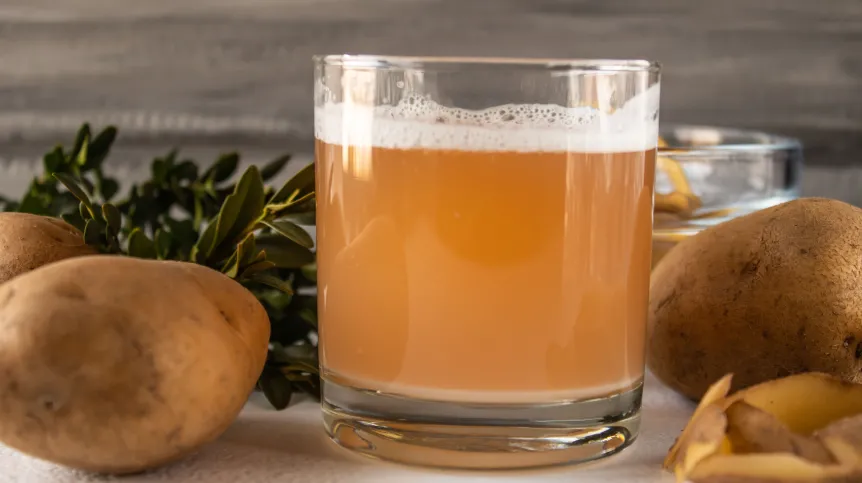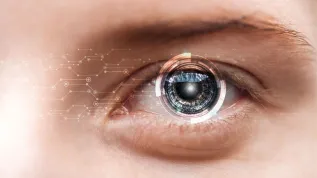
Potato juice can become a drug that selectively acts on different types of tumours and benefit patients who must follow strict diets for health reasons, show researchers from the Poznań University of Life Sciences.
They remind that this juice not only has an antioxidant effect, like other vegetables and fruits, but also anti-cancer activity proven in vitro, and alleviates the symptoms of patients with inflammatory bowel disease as shown in an animal model and in a clinical study.
Potatoes are eaten daily by millions of people around the world; it is one of the most important and popular crops. Potato juice (PJ) is a by-product of starch production - it contains numerous low-molecular compounds, but it is completely devoid of starch and fibre.
Currently, this juice is treated almost exclusively as waste. While it is sometimes used in fodder, but even then only 50% of its protein content is recovered.
Meanwhile, research conducted for years at the Faculty of Food Science and Nutrition of the Poznań University of Life Sciences, initiated by Professor Grażyna Lewandowicz, indicates that this raw material is valuable not only because of its high nutritional value, but above all because of its biological activity, which facilitates the treatment of certain diseases of the digestive tract and can prevent cancer. Earlier publications by various foreign research centres suggest that it also has antibacterial, antioxidant, anti-inflammatory, anti-diabetic, anti-hyperlipidemic, anti-hypertensive properties and helps fight obesity.
The use of potato juice in folk medicine dates back to the early 19th century, when it was used to alleviate the symptoms of gastrointestinal dysfunction. We now know the compounds responsible for this activity, but the mechanism remains unknown.
'In German-speaking countries, potato juice was used as a means of relieving all gastric ailments, including intestinal inflammation and stomach ulcers. Sanatoria were even opened for this purpose. In Poland, only folk healers (quacks) used potato juice as a treatment method, official medicine ignored this practice. To verify whether this raw material actually has a similar effect, we conducted detailed research on cell lines and rat models. And it turns out that it does', says Dr. Przemysław Kowalczewski, Lewandowicz's student and author of several publications and patents concerning the biological activity of potato juice.
'We deliberately induced inflammation of the digestive system of animals with hydrochloric acid, and then we fed them thermally preserved, spray-dried potato juice. It turned out that it greatly alleviated most of their ailments', he says. This research gave rise to a whole series of projects on the health-promoting properties of this raw material.
Dr. Kowalczewski's team detected a particularly beneficial therapeutic effect of potato juice in the case of cancer and inflammatory bowel disease (IBD), such as Crohn's disease and ulcerative colitis. Its lower effectiveness has been shown against gastric ulcers caused by Helicobacter pylori.
'When it comes to the effect of potato juice on ulcerative colitis, our discovery is groundbreaking', emphasizes Dr. Kowalczewski. 'We believe that in the future the ingredients of the juice could be used to construct a medicinal preparation or a dietary supplement that would alleviate intestinal inflammation. It would help a large group of patients who today have a very poor, deficient diet due to their condition, and often have to be treated surgically, for excample parts of the large intestine are removed, which worsens their quality of life forever'.
Researchers from Poznań have seven patents for products for IBS patients. 'We have developed special recipes free of ingredients that such patients cannot eat, but enriched with potato juice', says Dr. Kowalczewski. 'This is a whole line of products: from breakfast (bread), through lunch (pasta, pâté, sausage), to drinks. Clinical trials conducted in cooperation with the Poznan University of Medical Sciences have proven that including them in the diet reduces the CRP protein, which is an important indicator of inflammation. This is a huge success'.
Another extremely important result of the work of the team from Poznań was proving the cytotoxic effect of potato juice on digestive system cancer cells' Two substances are mainly responsible: solanine and chaconine. They belong to the group of glycoalkaloids and determine plant resistance to pathogens and pests. They are, however, toxic to humans. Their content in food, also in varieties of potatoes allowed for consumption, is subject to numerous restrictions.
'They show cytotoxic, anti-cancer activity', explains the researcher from Poznań. He reassures that consumer potato varieties grown in Poland are of very good quality and have a low content of glycoalkaloids.
'It should be emphasized that potato juice contains vitamin C and numerous antioxidant compounds from the polyphenol group. They play an important role in many different metabolic processes. They fight free radicals, which is a value in itself, but through this mechanism they also prevent DNA damage and the process of carcinogenesis', the scientist emphasizes.
The presence of these compounds enhances the anticancer activity of the glycoalkaloids in the juice and makes them less toxic to normal cells. Therefore, using preparations instead of pure glycoalkaloids in the treatment of cancer would allow to reduce the dose of toxic drugs and the negative side effects of treatment.
Another interesting fact is that while most antioxidants are very sensitive to heat treatment or long-term storage, potato juice is not. The analyses carried out at the Poznań University of Life Sciences show that high temperature even increases its antioxidant value.
Potatoes are also rich in potassium, iron and good quality protein. They have a high nutritional value, but a low sodium content.
'Vegetable proteins are believed to be less valuable than those from animal products', the scientist says. 'Our analyses have shown that the nutritional value of isolated potato protein is really very high, close to meat. Therefore, part of our research devoted to using this vegetable to create vegan products'.
Where does the bad reputation of potatoes as fattening vegetables that should be avoided in a slimming diet come from?
'This is not due to the properties of potatoes themselves, but the way they are served in our culture' the expert explains. 'We do not eat potatoes alone for dinner, we sprinkle them with fat, thick sauces, butter, cream. We eat them in traditional Polish cuisine dishes, with fried cutlets, roux, etc. We use them to make fries and chips. Such things really do fatten. Potatoes themselves do not'.
'On the contrary', he adds, 'research shows that there is no rapid insulin surge after eating potatoes, which means that you stay full longer than, for example, after eating rice. So they are better for people on slimming diets or for diabetics'.
It is worth mentioning that in some countries, although not in Poland, it is possible to buy properly processed, safe to consume potato juice.
Another aspect of the research conducted by the team from the Poznań University of Life Sciences was to check whether the health-promoting effect of potato juice depends on the variety of tubers and whether its individual components have an equally beneficial effect on the studied diseases.
It turns out variety indeed matters, and the whole juice has a much stronger health-promoting effect than its compounds considered individually. According to Dr. Kowalczewski, this proves that the key element is the right mixture of active substances. Just like potato juice.
'Potatoes themselves also have beneficial properties, but the juice has much more of them. This is due to the concentration of active substances; the percentage of beneficial compounds is higher in the juice. You would need to eat a few kilograms of potatoes to get the same effect as when drinking juice. I think that this is one of the reasons why the health-promoting effect of potatoes has gone unnoticed', the scientist says.
He explains that 200-400 grams of juice are obtained from 1 kilogram of potatoes. The dry matter is only 5% of the total juice. Half of the dry matter is protein and only the remaining part, about 2 percent of the entire tuber, are bioactive compounds. 'We also dry and concentrate this juice, so the concentration of beneficial substances in our preparations is very high. High enough to see therapeutic effects', he points out.
In addition to the clear pro-health effect, the possibility of using potato juice would also be of significant value from the point of view of environmental protection. 'Now it is often a burdensome waste', says Dr. Kowalczewski.
He adds: 'PJ surprises us at every turn, we keep coming up with new ideas for its use. This is especially important in Poland, which is a very large producer of this vegetable'.
The team from the Poznań University of Life Sciences plans further research on potato juice: both on cell lines and in animal models. 'If it is successful, we could think about human trials and developing a drug. For the time being, this is beyond our reach for financial reasons, but we want to +release+ this research into the world. Maybe someone else - a centre with more funds or a pharmaceutical company - will be interested in it and will pursue the topic', says Dr. Kowalczewski.
'It's a distant future, but the potential is huge', he concludes.
Find out more:
https://www.tandfonline.com/.../10.../07352689.2022.2057749
https://www.mdpi.com/2072-6643/15/1/114
https://doi.org/10.1080/07352689.2022.2057749
https://doi.org/10.1515/chem-2021-0109
https://doi.org/10.3390/molecules26040852
https://doi.org/10.1515/biol-2019-0017
http://doi.org/10.3390/nu11071523
https://doi.org/10.3390/nu10020259
PAP - Science in Poland, Katarzyna Czechowicz
kap/ zan/
tr. RL













